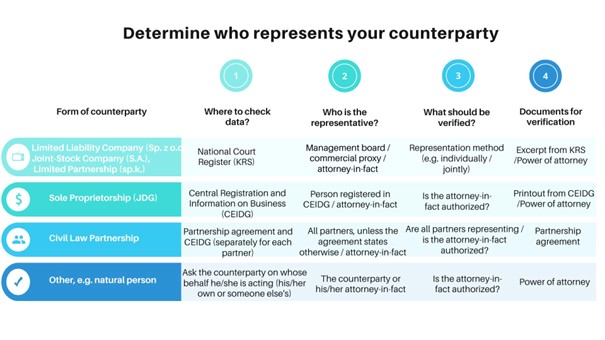Investment and commercial law How to determine who represents your counterparty? Here is a practical guide.

How to determine who represents your counterparty? Here is a practical guide.
How to determine who represents your counterparty? Here is a practical guide.
In business relationships, especially when concluding contracts, it is crucial to ensure that the other party is represented by a person authorized to represent the contractor. Failure to verify this may lead to negative consequences, including the most serious one: the invalidity of the contract. So how can you efficiently determine who actually represents your counterparty? Details below.
Determine the organizational form of your contractor
The first step is to determine whether the contractor operates as a sole proprietor, a civil law partnership, or a commercial company. This will determine which registers to search for information about the persons authorized to represent the company.
Check the data in the register:

Verify documents
• Request registration documents (KRS/CEIDG, articles of association) and the identity document of the person signing the agreement;
• If a representative is acting on your behalf, always request to see their power of attorney (preferably the original, but a scan is also sufficient).
Pay attention to details
Companies often have restrictions, e.g., the signatures of two board members are required, or a board member may only act jointly with a proxy.
Always verify exactly how the representation looks.
What if the contract was concluded via email or instant messenger (e.g., WhatsApp)?
If you are unsure about the authority of the person you are talking to:
• Ask in what capacity the person you are corresponding with is acting.
• request a power of attorney to be sent
• Never enter into a contract with a person whose status you cannot confirm with documents—otherwise, you may find that the contract has been concluded with an unauthorized person.
Summary
Determining who represents your business partner is a fundamental step in protecting your interests. Use official registers (KRS, CEIDG), analyze documents, and verify powers of attorney. Spending a few minutes checking the other party can protect you from serious problems, including contract invalidity or difficulties in pursuing claims.

